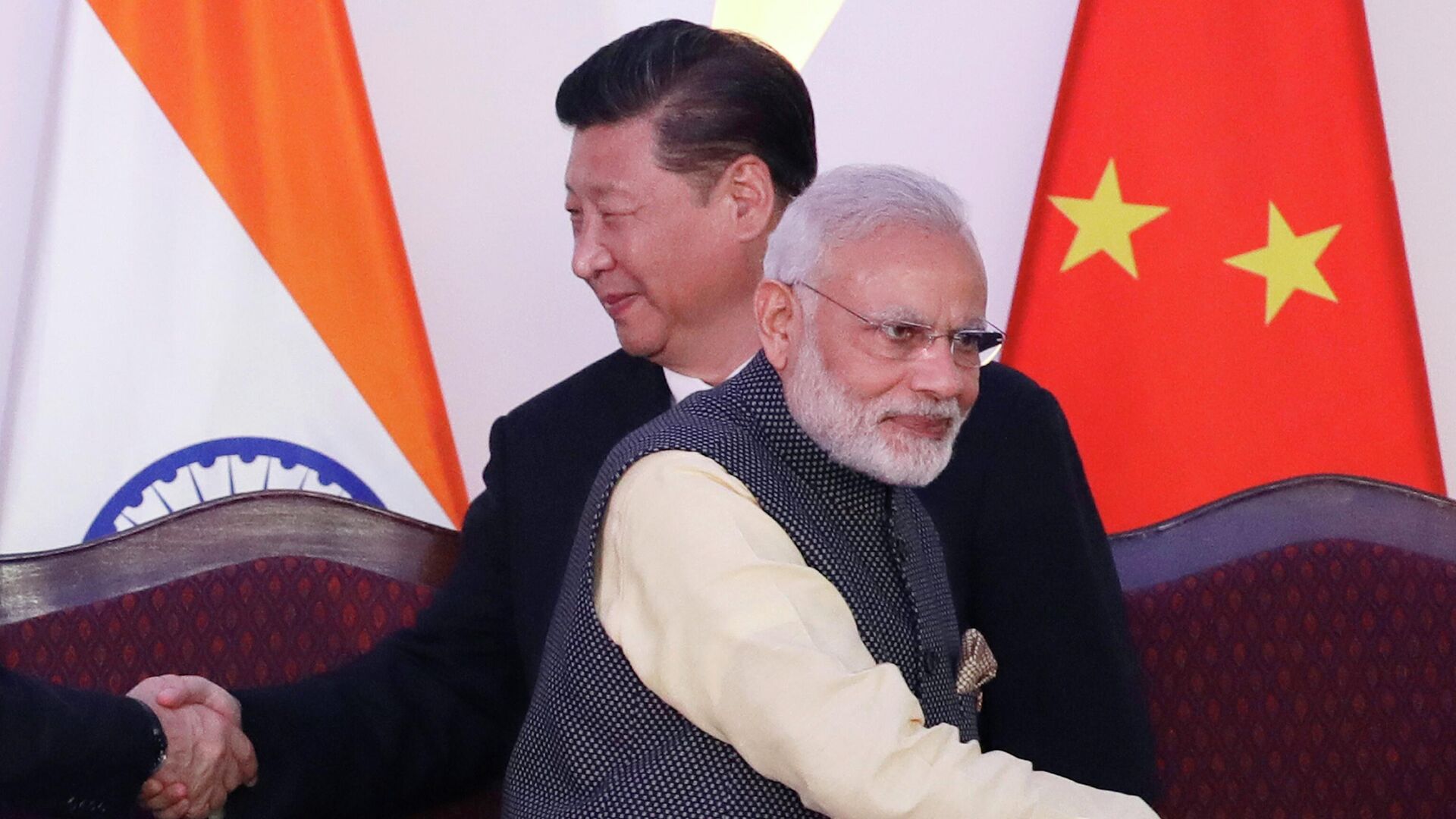https://sputniknews.in/20230816/india-and-china-dont-want-ladakh-issue-to-spillover-to-brics-g-20-expert-3637191.html
India and China Don’t Want Ladakh Issue to Spillover to BRICS, G-20: Expert
India and China Don’t Want Ladakh Issue to Spillover to BRICS, G-20: Expert
Sputnik India
India and China have a “common interest” in not letting the Ladakh border dispute spillover to multilateral groupings such as BRICS and G-20, where both the Asian economies are invested in advancing a multilateral global order.
2023-08-16T16:10+0530
2023-08-16T16:10+0530
2023-08-16T19:19+0530
sputnik opinion
india
china
people's liberation army (pla)
ladakh
us
narendra modi
xi jinping
brics
2023 brics summit
https://cdn1.img.sputniknews.in/img/07e7/07/1b/3242895_0:0:3071:1728_1920x0_80_0_0_7019a83cb68457b68562164f4314ff09.jpg
India and China have a common interest in not letting the Ladakh border dispute spillover to multilateral groupings such as BRICS and G-20, where both the Asian economies are invested in advancing a multilateral global order, an Indian expert has told Sputnik India.A joint statement after the corp commander-level meeting on 13-14 August said that both the countries agreed to resolve the remaining issues at the border in an expeditious manner and maintain the momentum of dialogue and negotiations through military and diplomatic channels.He reckoned that as far as Beijing was concerned, it must project to its neighbors that it is a benign power and deeply interested in resolving its border issue with not only India, but also its maritime disputes with southeast Asian nations in the South China Sea.Seshadri Vasan, the Director-General of Chennai Center for China Studies (C3S), told Sputnik India that the military commander-level talks were crucial to pave the way for prospective leaders’ meetings on the margins of upcoming summits.Is Economy Increasingly Driving Ties Between Countries?Vasan said that it was critical for Beijing to maintain a stable economic relationship with other countries as it grappled with a turbulent economic outlook in near term.Vasan reckoned that as Beijing was confronted with a lowering economic outlook and deflationary pressure, the Chinese leadership may try and decide to “tone down tensions” with countries with which it has been involved in disputes.In spite of border differences since 2020, bilateral trade between China and India hit a record high of $135.9 billion in 2022-23. India’s imports from China stood at nearly $101 billion, with trade surplus in favor of Beijing being almost $70 billion.Similarly, in the case of the US, China ran a bilateral surplus of $383 billion with its largest trading partner last year, per official data.Under Prime Minister Modi, India has been actively courting major western tech and other brands such as Apple as New Delhi seeks greater foreign investments to sustain its economic growth.Traditionally, many of these European and American companies have based their manufacturing operations out of China, but the Covid-related supply chain disruptions and geopolitical differences between west and Beijing have prompted a re-think on part of several big brands, with countries like India and Vietnam being viewed as alternatives.
https://sputniknews.in/20230725/india-and-china-agree-detente-in-bilateral-ties-crucial-for-entire-world-3169018.html
india
china
ladakh
us
beijing
asean
southeast asia
Sputnik India
feedback.hindi@sputniknews.com
+74956456601
MIA „Rossiya Segodnya“
2023
Dhairya Maheshwari
https://cdn1.img.sputniknews.in/img/07e6/0c/13/138962_0:0:641:640_100x100_80_0_0_2cb44360dbcdf6d84bf4b299cd045917.jpg
Dhairya Maheshwari
https://cdn1.img.sputniknews.in/img/07e6/0c/13/138962_0:0:641:640_100x100_80_0_0_2cb44360dbcdf6d84bf4b299cd045917.jpg
News
en_IN
Sputnik India
feedback.hindi@sputniknews.com
+74956456601
MIA „Rossiya Segodnya“
Sputnik India
feedback.hindi@sputniknews.com
+74956456601
MIA „Rossiya Segodnya“
Dhairya Maheshwari
https://cdn1.img.sputniknews.in/img/07e6/0c/13/138962_0:0:641:640_100x100_80_0_0_2cb44360dbcdf6d84bf4b299cd045917.jpg
india china news, india china border, india china war, india china tensions, india china latest news, india china talks, ladakh standoff situation, ladakh standoff, brics countries, brics summit, g20 india, g20 summit, india and china trade, india and china relations 2023, does india have a good relationship with china, what is the current relationship between india and china, why is china important for india
india china news, india china border, india china war, india china tensions, india china latest news, india china talks, ladakh standoff situation, ladakh standoff, brics countries, brics summit, g20 india, g20 summit, india and china trade, india and china relations 2023, does india have a good relationship with china, what is the current relationship between india and china, why is china important for india
India and China Don’t Want Ladakh Issue to Spillover to BRICS, G-20: Expert
16:10 16.08.2023 (Updated: 19:19 16.08.2023) The 19th Corp Commander-level talks between Indian Army and the People’s Liberation Army (PLA) on 13-14 August took place less than two weeks away from the BRICS Summit in Johannesburg.
India and China have a common interest in not letting the Ladakh border dispute spillover to multilateral groupings such as BRICS and G-20, where both the Asian economies are invested in advancing a multilateral global order, an Indian expert has told Sputnik India.
“It is in the interest of both India and China to not let the border dispute affect cooperation in multilateral groupings such as BRICS and G-20. Both the countries share the common goal of advancing a multilateral world order through multilateral groupings,” said Niranjan Marjani, an international relations expert and a researcher.
A joint statement after the
corp commander-level meeting on 13-14 August said that both the countries agreed to resolve the remaining issues at the border in an expeditious manner and maintain the momentum of dialogue and negotiations through military and diplomatic channels.
“It is encouraging that both the countries want to resolve the Ladakh border dispute in an expeditious manner. However, resolving the border matter is a long-term process and will possibly involve more rounds of negotiations, which will go on even after the BRICS and G-20 Summits,” Marjani said.
He reckoned that as far as Beijing was concerned, it must project to its neighbors that it is a benign power and deeply interested in resolving its border issue with not only India, but also its maritime disputes with southeast Asian nations in the South China Sea.
Seshadri Vasan, the Director-General of Chennai Center for China Studies (C3S), told Sputnik India that the military commander-level talks were crucial to pave the way for prospective leaders’ meetings on the margins of upcoming summits.
“Any change of the situation on the ground would require a political consensus by the two leaders,” Vasan said, referring to New Delhi’s demand that the pre-2020 status quo at Ladakh border must be restored to fully resolve the Ladakh border situation.
Is Economy Increasingly Driving Ties Between Countries?
Vasan said that it was critical for Beijing to maintain a stable economic relationship with other countries as it grappled with a turbulent economic outlook in near term.
“Economy is going to be the main driver of inter-state relations in the future. It is important for Beijing to have stable ties with countries it has trade surpluses with, including India and the US, for that matter,” Vasan, an Indian Navy veteran, said.
Vasan reckoned that as Beijing was confronted with a lowering economic outlook and deflationary pressure, the Chinese leadership may try and decide to “tone down tensions” with countries with which it has been involved in disputes.
In spite of border differences since 2020,
bilateral trade between China and India hit a record high of $135.9 billion in 2022-23. India’s imports from China stood at nearly $101 billion, with trade surplus in favor of Beijing being almost $70 billion.
Similarly, in the case of the US, China ran a bilateral surplus of $383 billion with its largest trading partner last year, per official data.
“China would certainly be uncomfortable with growing coordination among different countries to de-risk their supply chains and move manufacturing out of China,” Vasan stated.
Under Prime Minister Modi, India has been
actively courting major western tech and other brands such as Apple as New Delhi seeks greater foreign investments to sustain its economic growth.
Marjani said that having “peace and tranquillity” at the India border would also help Beijing in better navigating the economic headwinds.
Traditionally, many of these European and American companies have based their manufacturing operations out of China, but the Covid-related supply chain disruptions and geopolitical differences between west and Beijing have prompted a re-think on part of several big brands, with countries like India and Vietnam being viewed as alternatives.



